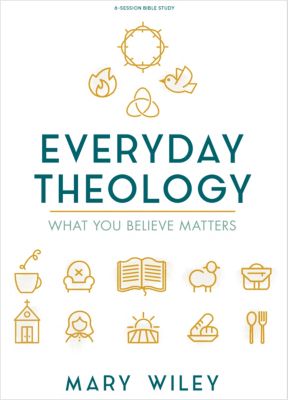
The 2022 State of Theology study revealed theological illiteracy in the church. How can pastors address this deficit and teach theology?
By Daniel Darling
The 2022 biennial State of Theology study conducted by Lifeway Research revealed some troubling findings about what evangelicals say they believe. Nearly 3 in 4 (73%) believe Jesus is the “first and greatest being created by God” and 60% believe the Holy Spirit is “an impersonal force, but not a personal being.” We have a problem. There’s a disturbing lack of theological literacy in the church.
So how should pastors and church leaders address this doctrinal deficit and teach theology? I’d like to humbly offer five suggestions:
1. Joyfully embrace the problem of biblical illiteracy
The temptation for those of us who have been seminary trained is to roll our eyes in a kind of cynical posture, decrying the state of the church. Or maybe we mock the preferences of the people in the pews: the music, the books, the content they consume. While that kind of reaction might go viral on social media among the leadership class or elicit a hearty round of laughter in the faculty lounge, it doesn’t help our people grow in their theological understanding.
Instead, pastors should embrace this moment as an opportunity to teach afresh wonderful, life-giving, soul-stirring Christian orthodoxy. We’ve been given a body of truth, handed down from the apostles, entrusted to our care as pastors and teachers. This is our mission.
“The answer to theological illiteracy isn’t arrogance but humble obedience to the call to joyfully teach theology.” — @dandarling Click To TweetIn his final letters, Paul urged the young Timothy to “command and teach these things” (1 Timothy 4:11, CSB) and to “commit” this body of truth to “faithful men who will be able to teach others also” (2 Timothy 2:2, CSB). The answer to theological illiteracy isn’t arrogance but humble obedience to the call to joyfully teach theology. We have the privilege, in 2022, to help open the eyes, hearts, and minds of those who sit under our teaching.
2. Don’t assume a level of theological literacy
This is one reality that has become obvious to me in every place I’ve pastored. There may have been a time in recent history when evangelical churchgoers possessed a basic framework of theology when they were attending perhaps three services a week. There was a substantial opportunity for theological instruction.
But today, consider that the average churchgoer may only attend church twice a month and likely hears less than an hour of sermon content. The rest of their weeks may be filled by other voices, some that amplify Christian truth and others that directly counter it. So, the starting place of our preaching should be simple, clear, and accessible. This doesn’t mean we water down the sacred mysteries of the Bible but that we lead our people to the food of God’s Word, not assuming they can walk there on their own.
“The starting place of our preaching should be simple, clear, and accessible.” — @dandarling Click To TweetThis might mean that in our preaching, we intentionally explain key terms—terms we were probably able to assume in another era. It means we recommend good books and resources. It means we’re patient and kind when, in our conversations, our parishioners don’t quite understand the theological language we’ve become accustomed to using. Jesus, as the Good Shepherd, patiently feeds and cares for us, His sheep. And so must faithful pastors patiently, carefully care for their sheep.
3. Be intentional about raising the theological literacy of their people
Given the impoverished state of theological literacy, it’s important for every church to have a plan. This likely includes intentionally explaining and teaching key theological concepts during exegetical preaching. But it also means we should be creative about other formats where we might teach sound theology, such as small group time and special classes. We might encourage one-on-one discipleship that is intentional and focused.
Pastors also, in many ways, serve as curators. We should regularly recommend good books to our people to help them see and understand Christian teaching. Churches might even put the regular and free distribution of books in their annual budgets to help encourage growth.
“Churches should be intentional about catechizing children in Christian orthodoxy in ways that are age-appropriate.” — @dandarling Click To TweetAnd theological training should not merely be aimed at adults. Churches should be intentional about catechizing children in Christian orthodoxy in ways that are age-appropriate. Thankfully, in the last few years, a plethora of helpful resources have been produced that can help parents and children’s ministry workers explain gospel truths.
4. Find ways to bridge the gap between the academy and the church
I believe every Christian who can go to seminary should. I’m grateful for my training and am glad to work at a school training the next generation for ministry. But there will be many in our churches who, for whatever reason, will not be able to go to school for formal theological education. So, churches large and small need to prioritize ways to bridge the academy and the laity. For some churches with adequate resources, this might mean developing institutes. For smaller churches, this could look like theology classes or weaving theological education in small groups or Sunday School.
“Learning theology shouldn’t merely be a hobby for the academically gifted but a priority for every follower of Jesus.” — @dandarling Click To TweetIf we don’t prioritize theological education, people will not have the strong foundations to resist heresy and false teaching that confuse and destroy Christian growth. Learning theology shouldn’t merely be a hobby for the academically gifted but a priority for every follower of Jesus.
5. Consider theological training an ongoing priority
Every generation needs to hear, afresh, the beautiful and sacred “faith that was delivered to the saints once for all” (Jude 3). We can’t assume because we had classes five years ago, that our task is complete. There are people streaming into our congregations, some new believers and others who have never been properly discipled. By assuming they’ll be OK, we’re forfeiting the opportunity to obey Christ’s command to “teach them to observe everything I have commanded you” (Matthew 28:20).
What’s more, our children and their children need to hear and learn the gospel afresh in their generation. We should never tire of sharing the same old, wonderful story year after year, decade after decade, generation after generation. This is a theme throughout the Scripture. We are tasked with the glorious task of passing on God’s good story again and again.

Dan Darling
Dan is the director of the Land Center for Cultural Engagement at Southwestern Seminary. He is the bestselling author of several books, including Agents of Grace.











